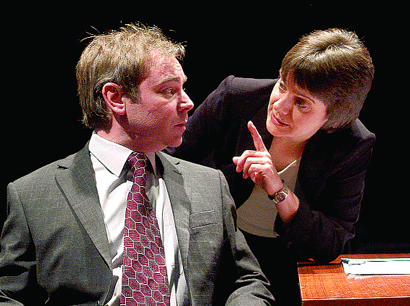Alan Ayckbourn explores six characters torn between expectations and lives that fall shortB
In his new play, “Private Fears in Public Places,” Alan Ayckbourn achieves a brilliant feat of social criticism as he charts the lives of six people who in many ways are lost in the world. As a playwright, Ayckbourn is a trenchant observer of contemporary behavior and the play, for all its comedy, pulses the overwhelming sadness and isolation experienced by each of the characters. Six rudderless people exist and interact in a world defined by a spiritual entropy that leaves them alone—and in many cases tortured—when what they want more than anything else is to be able to connect with one another.
The title, of course, is a dead giveaway, as the characters walk a tightrope between the personalities they feel compelled to show the world, and the embarrassing, sloppy and, occasionally torturous realities of their lives. This creates an underlying tension sustained throughout the piece, and while it is never resolved, each of the characters does come to a sort of nervous peace by the end.
The question Ayckbourn poses is: How do we live in a social and public world where our expectations are so at odds with reality? Can we stop the free-fall and find peace, or must we settle with an acceptable level of depression with occasional forays into sex, alcohol and novelty for novelty’s sake? For the scope of the question, the play is remarkably simple, as the characters intersect and interact in five different and isolated areas on the stage, but it is finally that simplicity that gives the play its resonance and poignancy.
Dan and Nicola are looking for an apartment as their long-term relationship begins to fall apart. They are working with a realtor, Stewart, whose loneliness is compounded by a discovery he makes about his assistant Charlotte. Charlotte, in addition to her work and her secret life, also takes care of Ambrose’s aging father. Ambrose is the bartender at the hotel where Dan goes to drink away his troubles, and where he takes Imogen, Stewart’s sister, when they meet through an online dating service. In the delicate telling of this story, we see just how our lives touch so many others—and how little we know or really are able to connect with others.
Ayckbourn doesn’t have a cure, nor does he drop so much as a clue. This is just one view of life, but anyone who has ever struggled with the dichotomy between a proper, public life and private longings can relate, and feel, to an extent, comforted.
The production is part of the Brits Off-Broadway series and features a stellar English cast. Melanie Gutteridge as Nicola is quietly desperate. Paul Thornley is terrific as Dan, a man lost and on the verge of self-destruction through alcohol. Adrian McLoughlin gives a sensitive performance as Ambrose, his private loss subsumed by his distant public behavior. Sarah Moyle as Imogen is heartbreaking in her hope and her sadness. Paul Kemp is outstanding as Stewart, and Alexandra Mathie is delightful as Charlotte, whose double life is the most extreme of the characters. For all its “excitement,” that secret life gives Charlotte no joy.
Oddly enough, the play is a comedy, but it is wry humor at best, finding its lyricism as much in the gaps between the characters and their public and private lives as in what is done or said between them.
If you like the kind of plot manipulation that characterizes the work of Agatha Christie or P.D. James, you may enjoy “Manuscript,” a new play at the Daryl Roth Theatre.
Ostensibly a whodunnit, one is more likely to ask who-wrote-it because were it not for the charming cast the evening would be insufferable. Paul Grellong is the perpetrator of this play that concerns three prep-school acquaintances, plagiarism, a possible gay relationship (or maybe they’re just very close friends) and revenge. The twists and turns are so predictable and the story so interminable and repetitive the only thing that could possibly keep you on the edge of your seat is anxiety to be gone.
Still, Jeffrey Carlson is fun as Chris, a kind of Bush-style preppy who skates through life on money and privilege. The accent he uses is of unknown origin and is at times a preppy parody, but he’s still appealing. Pablo Schreiber as David does well with his kind of clumsy best-friend act, and Marin Ireland is passable as Elizabeth. All of them tend to telegraph the plot and the direction by Bob Balaban does nothing to make up for the shortcomings of the script.
Still, this play will undoubtedly have a life. Look for it on a high school stage in your community in the near future. If there was ever a play that seemed manufactured for drama clubs. It’s this one.
gaycitynews.com





































